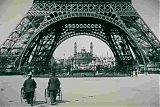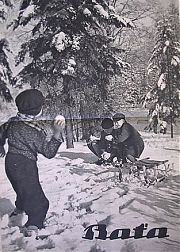BataStory.net
1900-1905
The very first European championship in speed skating takes place at Strbske Pleso. The World’s Fair opens in Paris. Modern Czech poet Vitezslav Nezval was born.
Zlin Bata moved into a new modern buildings erected opposite the railway station in July 1900. Not so easy to imagine today, but with its 120 employees, the Bata company was then the eighth largest enterprise in the whole Austrian-Hungarian Empire. The normal social status of cobblers was among the lowest at that time. That makes it all the more incredible the position achieved by the Bata company in this field.
In Prague, the premiere of *Antonin Dvořák*‘s “Rusalka” takes place. Conan Doyle publishes his “Hound of the Baskervilles ”.
An almost total boycott of Bata textile “baťovky” by common ordinary footwear stores forced Tomas to create entirely new, mobile‘ selling channels as we would say today. He ordered special horse-drawn carriages which served as movable depots and shops at the same time. Hired sales agents travelled with them within selected sections of the whole monarchy. And since the railway network was sparse, Bata mobile agents could target a much broader market than his competitors. (Deeper description of these business and marketing technologies can be found at Tomas Bata collaborator Anton Cekota books cited further on this site.)
Czech Frantisek Krizik puts into operation the first electrified railway line from Bechyně to Tabor (1903). A British physicist Rutherford comes with the theory of the atomic nucleus.
Already in 1903, Bata set up under a small machine workshop that does not provide just ordinary maintenance but manufactures special custom cutting tools and simple machines for the manufacture of footwear. That was the start of the later famous Bata Engineering.
Henry Ford founded the Detroit giant Ford Motor Company. The first annual cycling race Tour de France in France. The Wright Brothers flew the first 265 meters with their airplane.
Tomas Bata gradually installs in the Zlin factory three steam machines. Nearly ten years after founding the company, he gets back 417,765 crowns. And this with the dollar exchange rate of that time only at 1:5. The number of workers reaches 250 and Bata counts amongst the 8 biggest companies of the Austro-Hungarian Empire. He is still not not satisfied and, having visited Germany, seeks new experience this time in the New World.
The premiere of *Leos Janacek*’s Její Pastorkyně takes place. In Peru, an American archeologist discovers remnants of the one time capital of the Incas: Machu Picchu.
Such success by a 28 year-old entrepreneur is not stomached in Bohemia (already at that time…). A rumour is circulated saying that Bata had fled to America before going bankrupt. The truth is he’s accompanied by three of his workers: a salesman, a shoe-upper specialist, and a mechanic.
It’s easy to lose your self-confidence in Lynn, the American centre of industrial shoe production. The city counts some 200 shoe factories, each of them bigger than the one in Zlin. The challenge of matching that experience is simply enormous.
With the shooting of workers in Petrograd and a general strike, begins the first Russian anti-tsarist revolution, a precursor announcing the dictatorship of the proletariat.
Bata’s collaborators easily find jobs while Tomas, who wants to work incognito in America, as an ordinary worker, fails several times to get employment. He explains why in his memoirs: in job interviews, he kept saying confidently that he knew everything about shoe production. He later understands for the first time that in America the one who achieves predominance is the one who is the best (and this counts for any trade). With that useful experience and understanding that US methods must be adopted in Europe he returns to Zlin.




 Persons
Persons Documents
Documents



